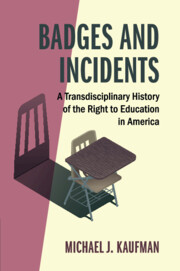Book contents
- Badges and Incidents
- Cambridge Studies on Civil Rights and Civil Liberties
- Badges and Incidents
- Copyright page
- Contents
- Acknowledgments
- Introduction
- 1 The Political Philosophy of American Education
- 2 American Education from Independence to Reconstruction and the Stamp of Slavery
- 3 Older but Not Wiser: America Industrializes and Embraces the Flawed Philosophy of Behaviorism in Education
- 4 Brown and Resegregation
- 5 Voluntary Race-Conscious Admissions Policies in Higher Education
- 6 San Antonio, Inequity, and the Human Struggle
- 7 Gender Discrimination in Education
- 8 Special Education and Inclusion
- 9 Civil Rights in the Educational Environment and Student Discipline
- 10 Current Reform Initiatives and a Better Way Forward
- Index
9 - Civil Rights in the Educational Environment and Student Discipline
Published online by Cambridge University Press: 09 September 2019
- Badges and Incidents
- Cambridge Studies on Civil Rights and Civil Liberties
- Badges and Incidents
- Copyright page
- Contents
- Acknowledgments
- Introduction
- 1 The Political Philosophy of American Education
- 2 American Education from Independence to Reconstruction and the Stamp of Slavery
- 3 Older but Not Wiser: America Industrializes and Embraces the Flawed Philosophy of Behaviorism in Education
- 4 Brown and Resegregation
- 5 Voluntary Race-Conscious Admissions Policies in Higher Education
- 6 San Antonio, Inequity, and the Human Struggle
- 7 Gender Discrimination in Education
- 8 Special Education and Inclusion
- 9 Civil Rights in the Educational Environment and Student Discipline
- 10 Current Reform Initiatives and a Better Way Forward
- Index
Summary
Chapter 9 evaluates the legal precedents and practices surrounding student discipline. It begins with an analysis of the key Supreme Court cases dealing with student due process rights: Goss and T.L.O. Both establish deference to educators as the cornerstone of student discipline. Coupled with a reaction to numerous violent incidents in schools, this has resulted in an overreliance on exclusionary discipline. The balance of the chapter examines the tension between exclusionary discipline and the stated aspirations of policymakers. When scrutinized, it becomes clear that despite lofty rhetoric, exclusionary discipline is tacitly accepted. This tendency was confirmed in the recommendations of the Federal Commission on School Safety convened by President Trump. The chapter concludes by investigating the rise of the school-to-prison pipeline, and links the troubling racial disparities that have arisen in student discipline with many of the themes discussed earlier in the book. Finally, it proposes a combination of trauma-informed pedagogy and restorative justice as a more effective, constructive, and inclusive approach that will properly educate a democratic citizenry.
Keywords
- Type
- Chapter
- Information
- Badges and IncidentsA Transdisciplinary History of the Right to Education in America, pp. 176 - 200Publisher: Cambridge University PressPrint publication year: 2019

